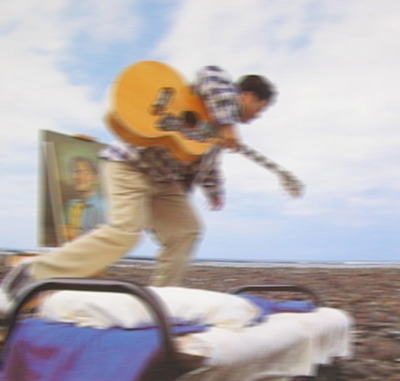Wade Hsieh

Pruniers en fleurs/Flower of plum, 2003
Chanson hakka traditionnelle / Traditional hakka song
Composé par Wade Hsieh /Composed by: Wade Hsieh
Voix /vocal: Wade Hsieh, Yueh-Chuen Peng
guitair/guitar: yun-chang Tung
piano/piano: Raindy Lin
harmoica/harmonica: Shou-ling Chi
percussion/percussion: Hong-yi Wang
Basse/Basse: Jia-jun Lou
Photo: Yĭng lóu xi zĭ
Wade Hsieh s’intérêsse aux deux arts, la musique et la peinture. Après avoir été diplômé de la faculté des Beaux-Arts à Taiwan, il a tourné vers la composition musicale cherchant dans les Hakkas son materiel de base qui est à la fois sa langue natal. Les Hakkas représente l’une des principales composantes du peuple «han», un peuple très ancien de l’Extrême-Orient. Leur nom, qui signifie “hôtes” ou encore “voyageurs,” est un héritage directe de leur histoire. Avec leur langue, il peut créer une tableau musicale moderne optant pour une grammaire musicale de nos jours. Et quand il utilise sa langue maternelle, c’est comme si l’artiste retournais à son enfance, comme si il dialoguais avec sa grand-mère. Pour interpréter ses chansons, il utilise plusieurs instruments de musique occidentaux et modernes, comme la guitare, le piano, l’harmonica en voulant présenter la nature simple mais ingénue des Hakkas, optimistes et satisfaits de leur sort.
Wade Hsieh is interested in two disciplines, music and the visual arts. After receiving his diploma from Fine Arts College in Taiwan, he turned towards composing music searching in the Hakkas his basic material which also happens to be his native tongue. The Hakkas represent one of the principal components of the «han», a very ancient people from the Extreme Orient. Their name, signifying “hosts” or “travellers” is a direct heritage from their historical culture. With their language he creates modern musical canvasses opting a contemporary musical grammar. And when he uses his mother tongue, it is as if the artist returns to his infancy, as if he is speaking with his grandmother.
To interpret his songs, he uses various occidental and modern musical instruments, such as guitar, piano and harmonica, in order to present the simple but ingenious nature of the Hakkas, optimists and satisfied with her fate.
Né et vit à Taiwan
Born and lives in Taiwan